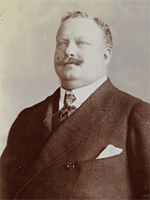King Carlos I of Portugal
Carlos I was King of Portugal for 21 years, in the last of the 19th Century and the first decade of the 20th Century. Assassination cut his reign short. 
He was born on Sept. 28, 1863, at Ajuda Palace in Lisbon. His father was the reigning monarch, King Luís I, and his mother was Queen Maria Pia. As the oldest son, Carlos was the heir apparent. He grew up studying the affairs of state. Part of his education was trips to other European countries, such as France and Germany and Italy and the United Kingdom, in all of which he saw firsthand the ways in which those countries were embracing modernization. He also inherited his father's love of languages and oceanography and later embarked on several voyages, publishing his findings. On May 22, 1886, Carlos married Amélie of Orléans. They had three children, two of whom lived into adulthood: Luís Filipe (1887) and Manuel (1889). King Luís died on Oct. 19, 1889, and Carlos took the throne. He inherited an unstable political situation, with both conservative and liberal factions becoming increasingly satisfied with the monarchy. Carlos's first diplomatic crisis was with the U.K. Portugal had longstanding colonies in Angola, on the west coast of Africa, and in Mozambique, on the continent's east coast. The Crown had recently claimed the land in between, in order to create a territory that stretched the width of Africa, backing up the claim with occupation. That claim stood in opposition to the hopes of the U.K., which was hoping to build a north-south railroad line from Cairo to Cape Town. On Jan. 11, 1890, the U.K. Government demanded that Portugal remove all of its forces from the disputed area and bow to U.K. sovereignty in the area. Not wanting a war, Carlos agreed to the demands and ordered his forces to withdraw. A movement to oust the monarchy found a perfect opportunity in this situation to stoke opposition to Carlos. A pair of bankruptcies a decade apart (in 1892 and 1902) further eroded the people's confidence in their king. Carlos had established ties with the ruling families of Europe during his tours of those countries a few years earlier. To demonstrate that all was well between the two countries, Carlos agreed to host the U.K. monarch, Edward VII, on a state visit in 1903. It was that king's first state visit. If anything, the visit by a foreign monarch exacerbated the volatile political situation, as cries to blame the king for the country's problems and to abolish the monarchy grew to a fever pitch. In 1906, Carlos chose as his prime minister João Franco. One of Franco's early suggestions to Carlos was to dissolve the Cortes; suspicious of a move toward absolutism, opposition elements began to make real plans for a change in leadership. A few years earlier, Carlos had made a royal residence of the Palace of Vila Viçosa, in the city of the same name nearly 100 miles east of Lisbon. The royal family had been staying there in early 1908. Carlos, Amélie, and Luís were returning to Lisbon on February 1. Manuel, the younger son, had
|
|
Social Studies for Kids
copyright 2002–2026
David White



 gone back earlier to continue his studies but on that day rode out to meet his family. He joined them and, in an open carriage, rode back to the Palace of Necessidades. It was as they were in what is now Commerce Square (but was then the Terriero do Paço) that two assassins fired on the royal family. Both of them fired shots at the king; the bullet that hit him in the neck killed him right away. In response, Luís had drawn his revolver and fired back. He had stood in order to return fire and so was an easier target for the assassins, who shot him a handful of times as well. Manuel was injured in the crossfire; Amélie was unharmed. Police arriving on the scene killed the assassins. The royal carriage rushed Luís to a nearby hospital, where he died. Several days later,
gone back earlier to continue his studies but on that day rode out to meet his family. He joined them and, in an open carriage, rode back to the Palace of Necessidades. It was as they were in what is now Commerce Square (but was then the Terriero do Paço) that two assassins fired on the royal family. Both of them fired shots at the king; the bullet that hit him in the neck killed him right away. In response, Luís had drawn his revolver and fired back. He had stood in order to return fire and so was an easier target for the assassins, who shot him a handful of times as well. Manuel was injured in the crossfire; Amélie was unharmed. Police arriving on the scene killed the assassins. The royal carriage rushed Luís to a nearby hospital, where he died. Several days later, 
